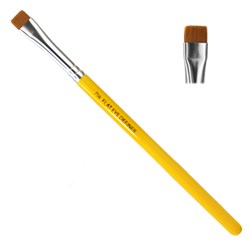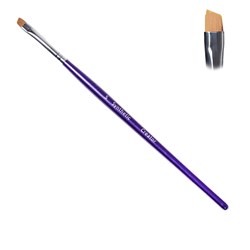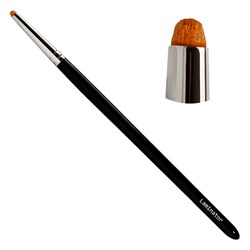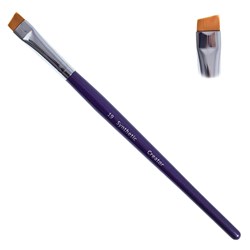Пензлі
Як вибрати і доглядати за пензлями для брів
Як правильно мити пензлі після фарбування брів фарбою або хною?
Після того, як Ви закінчили процес фарбування і пензель Вам не знадобиться, рекомендується негайно вимити його, або хоча б замочити в склянці води. Таким чином, фарбувальний продукт, хна або фарба, не пересушать ворс.
Мити пензель потрібно з милом і тільки у напрямку ворсу. Якщо Ви будете робити кругові рухи по долоньці, то від такого фізичного впливу пензель розпушиться і зіпсується. Після того, як пензель буде ретельно вимитий і при легкому віджиманні з нього виходитиме чиста вода, можна залишити пензель висохнути на серветці або рушнику.
Що робити з пензлями для фарбування брів? Обробляти необхідно чистий і майже сухий пензель кожні 2-3 тижні. Це можна робити за допомогою 0,05% хлоргексидину або спеціального дезінфікуючого розчину для пензлів. Головне, щоб у складі не було спирту, оскільки він сушить і псує ворс.
Як правильно використовувати пензель при роботі з хною і фарбою? Розмішуйте фарбу з оксидом, а хну з водою окремою лопаткою, пензлем або міксером. Безумовно, не робочим пензлем, який Ви використовуєте для створення форми.
На сайті beautymaster.com.ua можна знайти ідеальний пензель у будь-якому ціновому діапазоні.
При виборі пензля для брів покладайтеся на ті ж принципи, що і при виборі інших інструментів для макіяжу:
1. Жорсткість і довжина ворсу. Пензлі сильно відрізняються за характеристиками в залежності від виробника, і цим можна користуватися для вирішення різних завдань. Таким чином, із жорстким синтетичним ворсом Ви можете швидко і точно наносити барвник і створювати чисті акуратні лінії. Такий матеріал зазвичай служить дуже довго, рідко випадає і без труднощів очищається. Жорсткий ворс дозволяє наносити засіб щільним шаром і одночасно прочесати все волосся. М'які пензлі підходять для більш легкого і розтушованого макіяжу, коли немає необхідності створювати насичений колір або чіткі лінії.
2. Матеріал ручки. Тут варто спиратися тільки на особисті відчуття, адже комусь дерево зручніше, а комусь пластик. Однак слід зазначити, що занадто тонка або, навпаки, товста ручка, швидше за все, незручна.
3. Походження ворсу — натуральний або штучний. Незважаючи на всі переваги натуральних пензлів і їх популярність, для фарбування брів краще вибирати якісний синтетичний ворс. На практиці він значно виграє, довше служить, нечутливий до впливу барвників, а також без складнощів очищається, тому що не вбирає компоненти косметики. Також це кращий варіант для людей з алергічними реакціями.
4. Ширина головки пензля. Тут варто відштовхуватися від особливостей своїх брів — якщо вони тонкі, добитися рівного і чіткого фарбування широким сантиметровим пензлем буде досить складно. Без сумніву, якщо Ви звикнете до цього, це цілком можливо, але набагато зручніше, якщо пензель буде якомога ближче до ширини брів, тому в броу-майстрів їх зазвичай повний набір.
5. Очищення пензлів. При виборі пензля варто відразу ж подбати про його очищення. Ви можете мити пензлі теплою водою з м'яким миючим засобом після роботи або використовувати спеціальний очищувач для пензлів. М'який миючий засіб спеціально розроблений для дезінфекції косметичних пензлів. Засіб ефективно змиває всі текстури, не пересушує ворс. Ідеально підходить для штучних і натуральних пензлів.









































